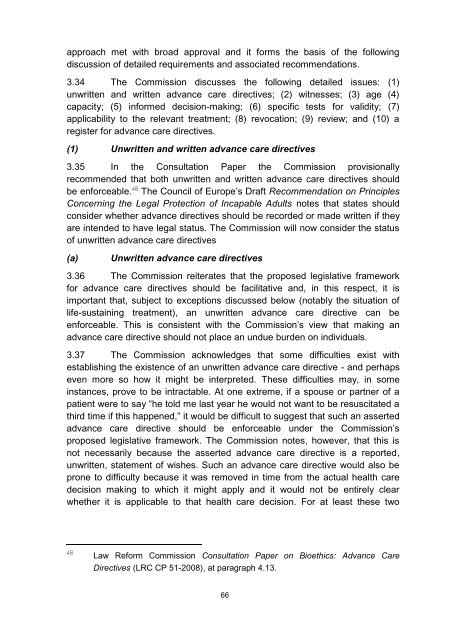Report on Bioethics: Advance Care Directives - Law Reform ...
Report on Bioethics: Advance Care Directives - Law Reform ...
Report on Bioethics: Advance Care Directives - Law Reform ...
Create successful ePaper yourself
Turn your PDF publications into a flip-book with our unique Google optimized e-Paper software.
approach met with broad approval and it forms the basis of the followingdiscussi<strong>on</strong> of detailed requirements and associated recommendati<strong>on</strong>s.3.34 The Commissi<strong>on</strong> discusses the following detailed issues: (1)unwritten and written advance care directives; (2) witnesses; (3) age (4)capacity; (5) informed decisi<strong>on</strong>-making; (6) specific tests for validity; (7)applicability to the relevant treatment; (8) revocati<strong>on</strong>; (9) review; and (10) aregister for advance care directives.(1) Unwritten and written advance care directives3.35 In the C<strong>on</strong>sultati<strong>on</strong> Paper the Commissi<strong>on</strong> provisi<strong>on</strong>allyrecommended that both unwritten and written advance care directives shouldbe enforceable. 48 The Council of Europe‘s Draft Recommendati<strong>on</strong> <strong>on</strong> PrinciplesC<strong>on</strong>cerning the Legal Protecti<strong>on</strong> of Incapable Adults notes that states shouldc<strong>on</strong>sider whether advance directives should be recorded or made written if theyare intended to have legal status. The Commissi<strong>on</strong> will now c<strong>on</strong>sider the statusof unwritten advance care directives(a)Unwritten advance care directives3.36 The Commissi<strong>on</strong> reiterates that the proposed legislative frameworkfor advance care directives should be facilitative and, in this respect, it isimportant that, subject to excepti<strong>on</strong>s discussed below (notably the situati<strong>on</strong> oflife-sustaining treatment), an unwritten advance care directive can beenforceable. This is c<strong>on</strong>sistent with the Commissi<strong>on</strong>‘s view that making anadvance care directive should not place an undue burden <strong>on</strong> individuals.3.37 The Commissi<strong>on</strong> acknowledges that some difficulties exist withestablishing the existence of an unwritten advance care directive - and perhapseven more so how it might be interpreted. These difficulties may, in someinstances, prove to be intractable. At <strong>on</strong>e extreme, if a spouse or partner of apatient were to say ―he told me last year he would not want to be resuscitated athird time if this happened,‖ it would be difficult to suggest that such an assertedadvance care directive should be enforceable under the Commissi<strong>on</strong>‘sproposed legislative framework. The Commissi<strong>on</strong> notes, however, that this isnot necessarily because the asserted advance care directive is a reported,unwritten, statement of wishes. Such an advance care directive would also bepr<strong>on</strong>e to difficulty because it was removed in time from the actual health caredecisi<strong>on</strong> making to which it might apply and it would not be entirely clearwhether it is applicable to that health care decisi<strong>on</strong>. For at least these two48<strong>Law</strong> <strong>Reform</strong> Commissi<strong>on</strong> C<strong>on</strong>sultati<strong>on</strong> Paper <strong>on</strong> <strong>Bioethics</strong>: <strong>Advance</strong> <strong>Care</strong><strong>Directives</strong> (LRC CP 51-2008), at paragraph 4.13.66
















